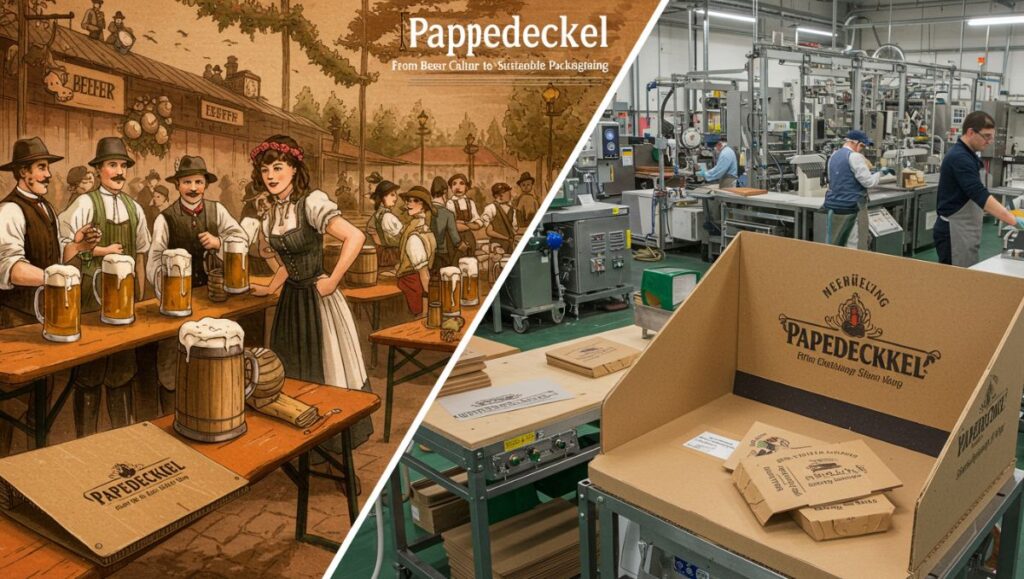The German word “Pappedeckel” translates to “cardboard lid” or “cardboard coaster.” While the literal meaning refers to a cardboard cover, the term is widely recognized in Germany as the coaster placed under beer glasses in pubs and breweries. Over time, Pappedeckel has become not only a practical item but also a symbol of German beer culture, sustainability, and everyday life.
Today, the Pappedeckel continues to serve multiple purposes: protecting surfaces from moisture, keeping beverages hygienic, and promoting environmentally friendly practices.
Historical Background of the Pappedeckel
The history of the Pappedeckel is closely tied to the tradition of beer drinking in Germany.
-
19th Century Origins: The first beer coasters were introduced in the early 1800s. They were made of thick cardboard or felt, designed to absorb condensation and protect wooden tables.
-
Breweries and Branding: By the late 19th century, breweries began printing their logos and advertisements on Pappedeckel, turning them into both a functional tool and a marketing strategy.
-
Collectible Items: Over time, beer coasters became collectible items, with thousands of designs showcasing regional breweries, festivals, and cultural motifs.
Thus, the humble Pappe deckel evolved from a practical item into a cultural artifact.
Pappedeckel in German Beer Culture
In Germany, beer is more than a beverage—it is a social experience. The Pappedeckel plays a small but important role in this tradition.
-
Table Etiquette: A coaster is always placed under a beer glass to protect wooden tables in pubs and beer halls.
-
Communication Tool: In some regions, customers place their Pappe deckel on top of their glass to signal they don’t want another refill.
-
Counting Drinks: Traditionally, bartenders may mark tallies on the coaster to keep track of how many beers a customer has consumed.
This makes the Pappedeckel both functional and symbolic, representing hospitality and community in German pubs.
The Practical Uses of Pappe deckel Beyond Beer
While beer coasters are the most famous form, Pappe deckel has wider applications:
-
Food Packaging: Cardboard lids are used for takeout containers, bakery boxes, and coffee cups.
-
Hygiene Protection: In cafés, lids protect drinks from dust or insects.
-
Brand Promotion: Restaurants and companies print their logos on Pappedeckel, turning them into cost-effective advertising tools.
-
Craft and DIY: Cardboard lids are sometimes reused in creative projects, from art supplies to children’s toys.
This versatility makes Pappe deckel an everyday essential in both hospitality and household contexts.
Environmental Benefits of Pappedeckel
In an era of increasing environmental awareness, Pappedeckel stands out as a sustainable alternative to plastic items.
-
Biodegradable: Made of natural paper fibers, they decompose faster than plastic.
-
Recyclable: Cardboard lids and coasters can be easily recycled into new products.
-
Renewable Material: As long as wood and paper production is responsibly managed, cardboard remains a renewable resource.
-
Plastic-Free Movement: Many cafés and breweries are replacing plastic lids with Pappedeckel solutions to reduce waste.
This eco-friendly appeal ensures that Pappe deckel continues to thrive in modern society.
Modern Innovations in Pappe deckel Design
While traditional cardboard coasters remain popular, innovation has transformed the Pappe deckel industry:
-
Custom Printing: Coasters now feature vibrant graphics, QR codes, and interactive designs.
-
Eco-Friendly Materials: Some manufacturers use recycled paper, bamboo, or plant-based coatings.
-
Multi-Use Designs: Modern Pappe deckel may double as menu holders, trivia games, or promotional coupons.
-
Smart Coasters: Experimental versions integrate NFC chips for digital promotions and contactless interactions.
These innovations show how even a simple object can adapt to the digital and sustainable age.
Pappe deckel Collecting as a Hobby
For many enthusiasts, collecting Pappedeckel (beer coasters) is more than just a pastime—it’s a window into culture and history.
-
Variety: With thousands of breweries worldwide, each coaster design reflects local culture and branding.
-
Clubs and Associations: In Germany and beyond, coaster collectors form communities, sharing and trading rare designs.
-
Historical Value: Vintage coasters can reveal changes in advertising, design trends, and even brewery mergers.
This has elevated the Pappedeckel from a disposable item to a cherished collectible.
The Role of Pappedeckel in Branding and Marketing
For breweries and cafés, the Pappedeckel is more than functional—it is an affordable and impactful marketing tool.
-
Brand Awareness: Every time a coaster is used, the brand logo remains in front of the customer.
-
Memorable Experience: Unique designs make the drinking experience more enjoyable.
-
Souvenir Value: Tourists often take coasters home, extending the brand’s reach beyond the pub.
This dual role—practicality and promotion—explains why Pappedeckel remains central in the hospitality industry.
Sustainability Challenges and Future Outlook
While Pappedeckel is eco-friendly compared to plastic, there are challenges:
-
Paper Waste: Large-scale use still contributes to paper waste if recycling systems are not efficient.
-
Overconsumption: Disposable culture can lead to unnecessary waste, even with biodegradable materials.
-
Innovation Needs: The industry must continue finding new ways to balance durability, cost, and sustainability.
The future of Pappedeckel likely lies in circular economy practices, where recycled materials are continuously reused.
Conclusion
The Pappedeckel may seem like a small, ordinary item, but it carries enormous cultural, practical, and environmental significance. From protecting pub tables in Bavaria to promoting eco-friendly packaging solutions, the cardboard lid reflects tradition, innovation, and sustainability.
In a world searching for greener alternatives, Pappedeckel is a shining example of how simple, recyclable products can make a big difference. Whether you see it as a beer coaster, a coffee cup cover, or a piece of branding art, the Pappedeckel is proof that even the simplest items can tell a rich story.







